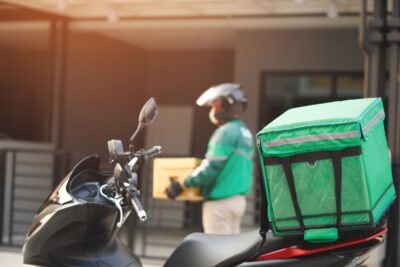
Liability in a food delivery accident is determined by who was at fault and whether the driver was actively working at the time of the accident. These factors play a crucial role in establishing who is financially responsible for damages or injuries.
An Atlanta food delivery accident lawyer can help clarify your rights, especially when dealing with complex factors such as insurance policies and employment status. Understanding how liability is assigned and who is responsible can make a significant difference in how you pursue a claim and seek compensation.
Can the Food Delivery Company Be Held Liable for an Accident?
A food delivery company can sometimes be determined liable for an accident involving one of its drivers. Liability often depends on whether the driver is considered an employee or an independent contractor and if they were actively working during the accident.
Factors That Affect Company Liability:
- Driver’s Employment Status: If the driver is an employee rather than an independent contractor, the company may be more likely to share liability.
- Driver’s On-Duty Status: If the driver was “on the clock” and making a delivery, the company might bear responsibility, especially if the driver was following company policies.
- Vehicle Ownership: The use of a company-provided vehicle could increase the company’s liability in an accident.
Consulting an Atlanta car accident lawyer can help clarify the company’s potential liability and assist in holding it accountable if needed. They can assess the circumstances of the crash and determine if the company shares fault.
Get the strong arm
How Are Damages Calculated in a Food Delivery Accident?
In a food delivery accident, damages are calculated based on the injuries and losses suffered by those involved. Damages can include medical expenses, lost wages, property damage, and pain and suffering. The extent of these damages often depends on the severity of the accident and its impact on the victim’s life.
In Georgia, the modified comparative damage rule applies. This means your compensation may be reduced by your percentage of fault in the accident. If you are found to be 50% or more at fault, you may not be eligible to recover any damages. Therefore, establishing fault and calculating damages accurately is key to ensuring fair compensation.
Types of Damages to Consider:
- Medical expenses: Includes emergency care, hospital bills, rehabilitation, and any ongoing treatment costs.
- Lost wages and future earnings: Compensation for time off work and any potential reduction in earning capacity.
- Property damage: Covers repairs or replacement of your vehicle and any personal property damaged in the accident.
Does Liability Change If the Driver Was Off-Duty?
Yes, liability can change if the food delivery driver was off-duty at the time of the accident. When a driver is not actively working—such as driving to a personal location or not logging into the delivery app—liability typically falls on the driver alone, covered only by personal insurance.
However, if the driver was on a break but still logged into the app, it can be determined that liability in food delivery accidents may be shared between the driver and the delivery company. The driver’s activity and status during the accident are key factors in assigning fault.
How “On-Duty” vs. “Off-Duty” Status Affects Liability:
- Off-duty drivers: Usually only covered by their personal auto insurance policies.
- Active deliveries or logged-in status: If the driver is logged into the app, the delivery company may share liability.
Understanding the difference between on-duty and off-duty status helps clarify who is responsible for damages. These distinctions impact how compensation is pursued and which insurance policy will cover the accident, making it vital to assess the driver’s status carefully.
What Should You Do Immediately After a Food Delivery Accident?
If you’re involved in a food delivery accident, taking immediate action is crucial for your safety and any future legal claims. Start by ensuring everyone is safe and seek medical attention, even for minor injuries, as this will also help document your condition.
After that, report the accident to local authorities and exchange information with the other driver(s). Be aware that the car accident statute of limitations in Georgia is generally two years from the accident date. Collecting details like insurance information, contact details, and the driver’s delivery status is key to meeting deadlines and supporting your claim.
Taking these steps helps protect your rights and strengthens any legal claims you may need to make. Acting quickly and documenting everything properly ensures you have the best chance for compensation.
How Can a Lawyer Help After a Food Delivery Accident?
If you’ve been in a food delivery accident, working with a knowledgeable law firm can help you seek the compensation you deserve. At John Foy & Associates, we have recovered over $1 billion for our clients and understand the complexities involved in these types of accidents.
With our experience in Georgia personal injury law, our team can help guide you through the process, protecting your rights and working toward the best possible outcome. Getting proper legal support can make all the difference in your recovery and ensure that all responsible parties are held accountable. Call us today.
404-400-4000 or complete a Free Case Evaluation form





